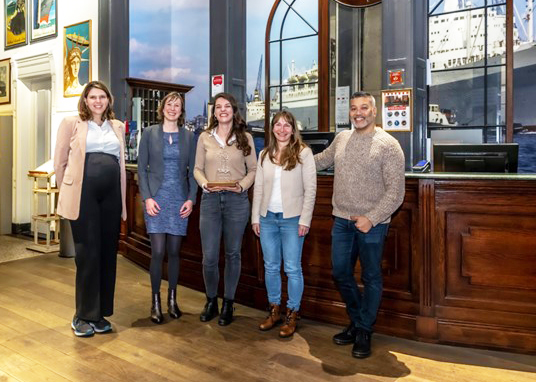TU Delft wins LCDA
We are proud to announce that an interdisciplinary team from TU Delft secured first place with a process-mining case study in the Leadership Challenge with Data Analytics (LCDA) organised by Erasmus Centre for Data Analytics in collaboration with Surf.
The winning team, comprising Nardo de Vries (Extension School for Continuing Education), Andra Gherghiceanu (Teaching and Learning Services), Zhane Hunte (Corporate Policy Affairs), Bonnie van Huik (Education & Student Affairs) and Amy Vriend (Innovation & Impact Centre), focused their efforts on delving into the world of process mining. Specifically, their methodology uses timestamps in the data logs of mouse clicks to meticulously analyse the behaviour of learners in online courses. The findings can then be used to improve course design and to support learning outcomes, as well as to design improved processes, and inform policy and implementation decisions at an organisational level.
Identifying bottlenecks and loops
The TU Delft’s team used as their user case the data from one of the Massive Open Online Courses (MOOC) by the Extension School for Continuing Education, which is freely available to anyone globally. Through the anonymous data collected on mouse clicks, they identified learners' paths throughout the course, tracking where they followed the intended steps and where they deviated from them. In this manner, they also detected bottlenecks and loops and ascertained what could be the potential problems encountered by learners – and what solutions to propose.
Their findings
Notably, the team's findings indicated that successful learners were less likely to follow the linear path intended by the course design and would move through the modules in backward and forward-seeking patterns. This insight underscores the significance of adopting data-driven decisions in course design to support a better learning experience. This aligns with the learner-centred approach to course development at the Extension School for Continuing Education. It gives learning developers and course teams further tools to improve and support self-regulated learning and deeper understanding.
Functional and scalable
The jury, comprised of industry experts, commended the team on their compelling final pitch and for the applicability of their solution: producing a functional and scalable prototype applicable across a broad spectrum of processes.
Lessons learned
Reflecting on the win, Nardo de Vries said: "I was delighted and surprised to hear our group being called out. We worked well as a team throughout the process, and I am now excited to imagine what the next steps could be. We hope to employ the prototype in practical discussions with leadership about strategy and evidence-driven policy.”
The lessons learned hold the potential to enhance campus education, for example facilitating options for self-regulated learning, such as using digital learning materials to revisit concepts within a course and to apply flexibility to (blended) teaching.
Advice for prospective teams
Nardo recommended determining clear rules of engagement beforehand, especially as the ethics of using data is a tricky terrain and it is vital to ensure everyone on the project has transparent access to the data.
Other participating teams in the LCDA programme, including ROC educational institutions, and a collaboration between the Rotterdam and The Hague municipalities and the non-profit Grenzeloos Datalandschap, showcased projects that ranged from dashboards for study advisors to leveraging AI to predict street cleaning needs to address urban waste management challenges.
About LCDA
This rigorous programme, designed to prepare participants for a data-driven future, employs gamification and covers aspects such as big data collection, analysis, and prediction, and equips teams to address the ethical, privacy, and technical questions that organisations are inevitably faced with.
